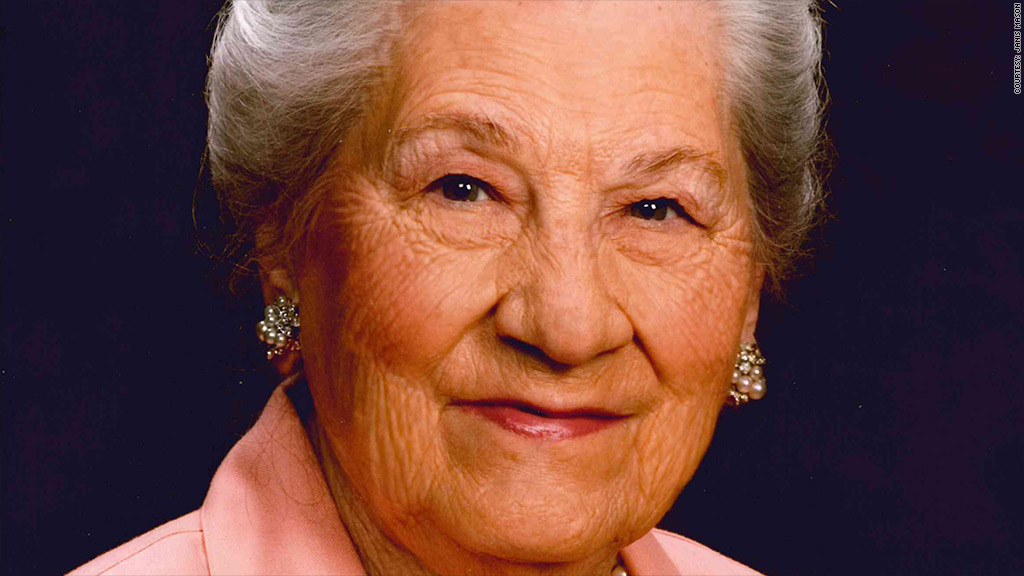
Janis Mason is 94 and has been receiving Social Security benefits for nearly 30 years. Because she has outlived her savings, the monthly checks are her only source of income.
"I always cross my fingers that the money can last the whole month," Mason said.
To keep pace with the rising cost of living, the Social Security Administration announced a 1.7% benefits increase for 2013. This will give a $19 boost to the average benefit of $1,130 a month.
For some of the 56.3 million people who get Social Security -- either because they are retired or disabled -- the increase may not be enough to keep up with rising expenses.
"We're grateful for any small increase [in Social Security benefits], but believe me, any small increase doesn't begin to cover the major increases we're seeing in things like vegetables, fruits, bread and milk," said Mason.
Part of the problem is a disconnect between the official inflation figure and what seniors actually pay, experts and seniors say.
Related: How to make your retirement savings last
The inflation number used to calculate the cost of living adjustment is based on spending patterns among workers of all ages and across hundreds of items. A more accurate calculation would put more weight on the items that seniors purchase most frequently -- like food, gas and medical care, according to the American Institute for Economic Research.
Medical care costs alone have jumped 4.1% from a year ago based on the latest inflation data, while prices for food climbed 1.6% and gas rose 6.8%. Meats, poultry and fish cost 2.1% more, and the price of flour is up 2.5%.

Mason's monthly benefits are a little under $2,000 -- an amount that grew when her husband died 19 years ago. Half of her payment gets eaten up by her mortgage, home insurance, supplemental insurance and utility bills. She budgets the rest carefully to afford groceries, phone, cable and Internet bills, medical prescriptions and anything else that comes up.
She clips coupons and buys lots of canned food. She rarely buys new clothing, and she recently scrapped one of her newspaper subscriptions.
"Some months I worry that a check might reach the bank before my Social Security check is deposited on the 3rd," she said. "Other months I might have something left over -- lots depends upon whether I treated myself to something special at the grocery store, had an emergency of some sort or even bought something to wear."
Margaret Toman, 67, experiences the monthly Social Security squeeze on two fronts.
For the past 12 years, she has been caring for her 99-year-old mother, who receives nearly $1,400. And after Toman was laid off from her job in 2010, she began collecting Social Security benefits of $1,400 as well. They have no savings left.
Related: Scam targets seniors' Social Security benefits
After supplemental insurance and premiums for Medicare, prescription drugs and life insurance, Toman said the two of them are left with a combined $1,000 for their mortgage, utilities, groceries, car insurance, medical supplies and adult daycare for her mother.
Meanwhile, costs are going up all around them. Toman said gas and food hit particularly hard. For example, prepared meatloaf was $5 a little more than a year ago, and now it's $7.49. Liverwurst used to cost her $2, and she now pays $3.69.
Toman said she appreciates the monthly benefit but it doesn't reflect "real world" prices. "I just feel like I'm slipping on banana peels trying to catch up."
Mark Houlné, 63, has also been learning to budget his benefits. He began collecting Social Security last year after getting laid off from a manufacturing company in 2009 and failing to find full-time work.
Their income totals $3,100 a month: His $1,500 in Social Security and a $300 monthly pension, as well as $1,300 in disability for his wife, Susan, who had a cerebral hemorrhage in 1987.
Their biggest expense is rent, at $975 per month; food and other household expenses cost them about $850. They spend another $1,080 on electricity, water, phone, Internet, cable, car insurance, credit card payments and medical bills. And they try to keep a $100 buffer for incidentals like a new battery for the car or haircuts.
Related: Social Security: Where Obama and Romney stand
"We never take vacations, go out to eat only on our anniversary, buy no birthday or Christmas presents -- except for our grandkids -- never shop at the mall, never go to the movies or shows and control costs by carefully planning a budget," said Houlné.
They're uninsured, so their biggest concern is medical expenses. When his wife, Susan, had shingles recently, they had to use their credit card to cover $900 in doctor fees and medications.
A $1.7% cost of living increase will mean a $48 monthly bump for them.

